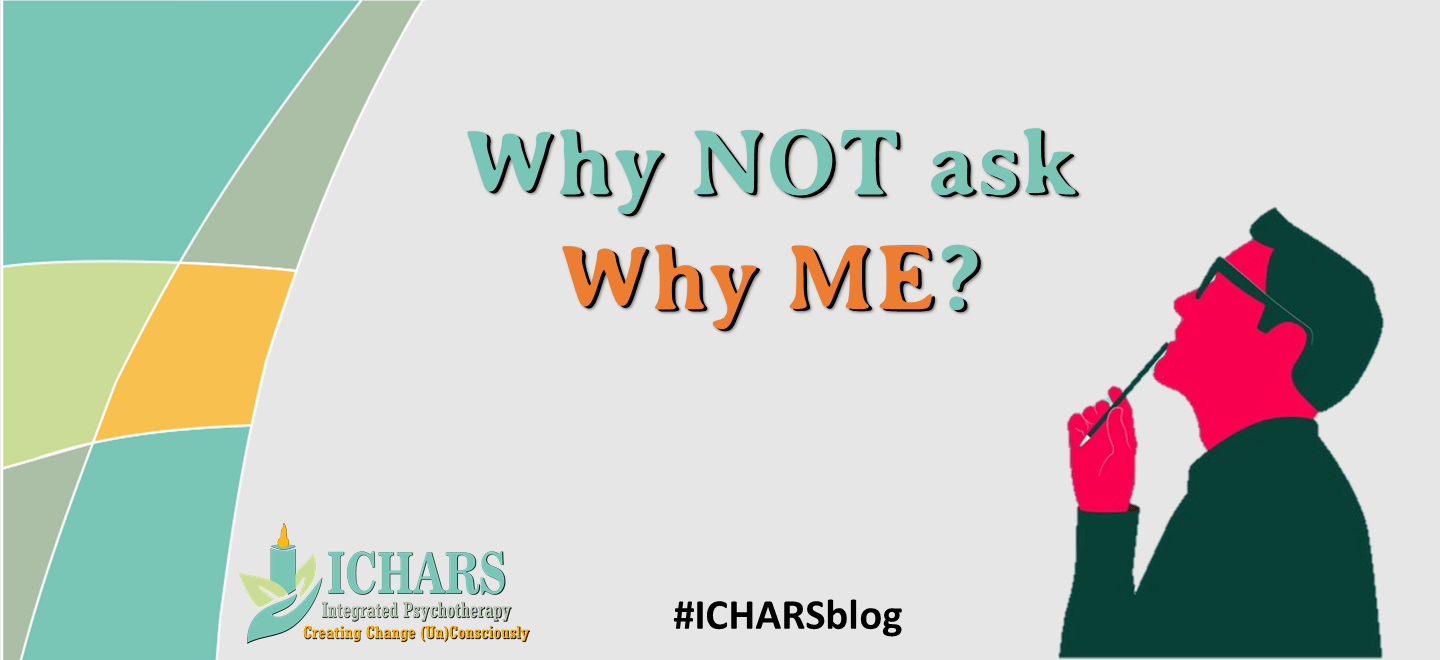Generally speaking, when people have a problem, what question do they ask themselves?
“Why me”?
Isn’t this the most common question?
It is and yet it is also the most useless one to ask!
Why is “Why me” not so useful?
The answer to the question “Why me” generally doesn’t really help you resolve the problem. But it has the potential to make your problem worst.
 If they keep asking themselves “Why me?”
If they keep asking themselves “Why me?”
What answer are they expecting their mind to give?
That either they are dumb, or their partner is dumb or that people cannot be trusted or that they made a mistake….
These are some of the possible answers… aren’t they?
But are any of these answers actionable?……. i.e……. do any of these answers help you in taking steps to resolve the problem.
The answer in most cases in No
If not why me, then what question to ask?
Think of your mind as very powerful search engine.
When you go to google, what are your search results based on?
The results are based on your past searches and the keywords that you type. So, if I type “why do relationships go bad”, I get one set of results and if I type “tips to improve relationships”, I get a different set of results.
Which set of results will be more useful and actionable?
The later one i.e. “Tips to help me improve my relationship”.
Given that the human mind is probably one of the most advanced search engine….. wouldn’t it be better to ask a question that provides actionable outcomes.
Why Me and Unconscious
 An important thing to keep in mind about the mind is that it doesn’t like unanswered questions.
An important thing to keep in mind about the mind is that it doesn’t like unanswered questions.
To illustrate the discomfort that mind experiences because of unanswered questions or incomplete information take the scenario where…. someone was saying something and forget to complete the sentence.
You want to know what next, don’t you!
There are times when people forget words. Don’t we generally jump in and fill in the word?
We’re not helping them but helping ourselves, as the mind doesn’t like unanswered questions and incomplete information.
Apart from the fact that the mind doesn’t like unanswered questions…. another important thing to know is that when the conscious mind can’t find the answer, the unconscious part of the mind takes it personally and starts searching for the answer till you find it.
 To understand this…. go back to a time when you were trying to recall someone’s name and it just wouldn’t come to your mind.
To understand this…. go back to a time when you were trying to recall someone’s name and it just wouldn’t come to your mind.
You would have tried for some time then given up. But after you give up…. few moments later something happens…. and the name just pops up in your mind.
So where does name pop up from….. you had consciously stopped searching for the name.
The moment the conscious says I can’t find it, the unconscious takes it personally. “How is it possible to not get the answer?”
So, while you, consciously start doing other work…. the unconscious in the background will keep searching for the answer. It goes on…. what is known as the transderivational search.
Now imagine what happens when someone asks “why me” and is not able to find an answer consciously. Their unconscious keeps searching for the answer. This makes the consequence of getting stuck on the question “why me” far more worse.
Three things will happen here:
- Either the answer will come from within or
- the unconscious will drive your attention or focus to things from where you can get the answer.
- In case we don’t find an answer, the mind can come up with its own stories to create an internal sense or feeling that we know the answer. These stories can many times be very vivid, elaborate and also scary.
The answers that we get from within are generally in the form of an insight or an intuition or it could also be in form of a recall.
As for getting answers by driving focus or attention to a new area or thing is concerned….. a good example is when people say that:
“I was looking for some answers. I came across this book, opened it and found the answer to my question right in front of me.”
Its not that you came across the book coincidentally. Many a times you will notice seeing the same book again and again till you pick it up and read it.
This is because you asked your unconscious for the answer and your unconscious kept diverting your attention towards the book which could probably have the answer.
Another example is when you go to a website, same website you have gone to multiple times.
But the day you had different question in your mind, you will see the article. The article was there last time you visited the website also. You had just not observed it.
If you followed the instructions, notice how you missed out on information that was right in front of you. You missed all that information because?
While you were observing the ball being passed, there were so many other things that were happening at the same time…. the background changes colour…… the girl from the black team leaves…. there is gorilla which passes by thumping his chest.
It is highly unlikely for you to observe all of this at the same time.
- Almost 50 to 60% of the people don’t see gorilla.
- Almost 90% don’t see a gal leaving the screen.
- Almost 99% don’t see the colour changing in the background.
And yet it was all happening right in front of you.
In fact, there is a bit too much happening in front of you.
The reality is that the conscious mind can only focus on few things at a time.
So how does the conscious mind determine where to focus?
The focus is driven by the questions asked.
In the video the question that is asked is “how many times the ball has been passed between the players of the white team?”
Because the mind has to focus on that, everything else that will distract you, gets deleted.
Going back to the bad relationship example, when you ask, “why me?”
Though the answers to what you can do to improve your relationship are there in front of you, you generally don’t notice them because your mind is focusing on why the relationship is bad.
What if I were to ask a different question, let’s say “what can I do to improve my relationship from here onward?”
What does the new question do?
It simply changes the focus of attention from the problem to what the solution should be.
So instead of….. why me….. wouldn’t:
- What next?
- How do I do this?
- What will be the best way of doing this?
- Who can help me in doing this?
be more effective questions to ask.
What will happen when you ask an effective questions to yourself?
Once you start asking effective questions, remember that sooner or later you will get an answer.
- Some answers can be immediately applied for e.g…If I want to become a good public speaker and I ask “what can I do to become a good public speaker?”The answer I get from within or outside is to visit a particular therapist or join a specific public speaking class.These are actionable answers. I can immediately act upon them.
- But then there are also situations where the answer I get is not specific or not actionable and requires more clarity.For e.g. if I want to raise capital for my business and I ask, “What steps can help me raise capital for my business?”The answer that comes to me is “Prepare a business report and submit it to banks or investors?”But…. I don’t know how to create a business report.Now, what do I do?I can continue to ask next question, where can I learn to create a business report? Or who can help me in creating a business report?
Which means, some answers can be immediately applied while some answers lead to more questions.
You keep using this process of asking questions till you get an answer which you can apply. Once you find the answer that you can apply, you go ahead and apply it.
If application of the answers throws up more questions, you continue the process till you achieve the desired outcome.
This is one of the easiest way of keeping yourself on track.
What would be the best way to use questions effectively?
To my clients and participants, I generally recommend the following process after they have set their goal or outcome.
- Every morning when you wake up, ask yourself “what can I do today to move closer to my goal?”Keep that question open, think of couple of things that you can do but mentally don’t close the question. Leave it open so that your unconscious can continue to think over it.Over a period of time, you will notice that these questions that you have left open…… begin to influence the nature of your interactions and…. your actions and behaviours.
- Also, every night before you sleep, ask yourself a question “what have I done today to move closer to my goal?”Whatever answers you get will make you feel good!You would notice some steps that you have taken and you will also realise that there were certain things that you could have done but you haven’t?
- These things that you haven’t done can be added to your next days to do list. This can also help in ensuring that you don’t miss out on applying certain ideas or answers.
- Continue this chain of questions.Remember you can always ask questions for doing new things and achieving new goals and also for doing the existing things better.
This topic and many more like these are covered in our practitioners programs for developing advanced therapeutic skills and advanced coaching competencies. If you are a coach or a mental health practitioner, you must check out the respective programs.

